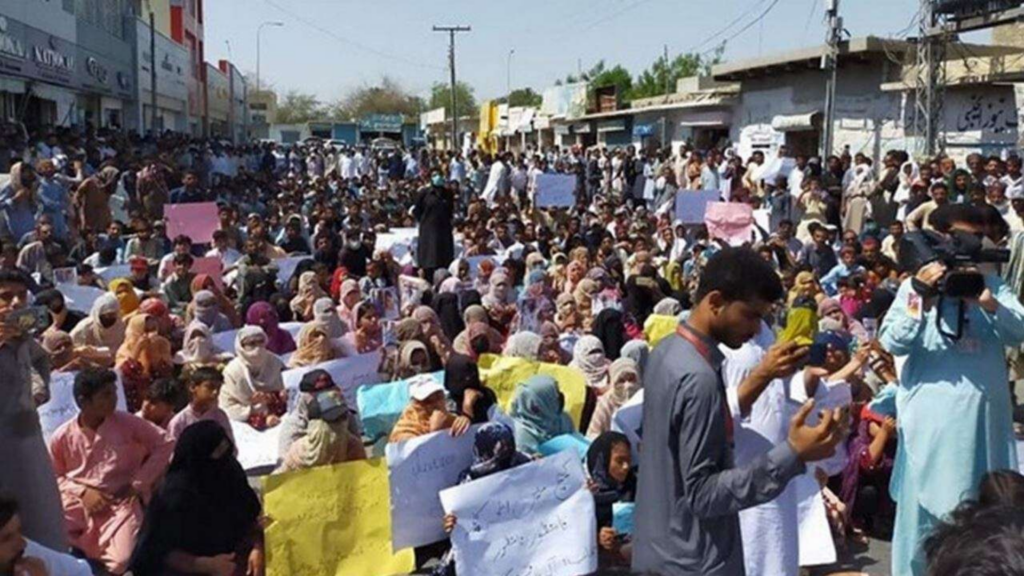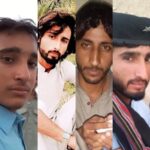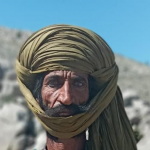Killing of women at their homes seems to have become the new normal in Balochistan. A lady, 27-year-old Kulsoom, was killed by three robbers at her house in Dazin of District Kech when she refused to give her belongings. According to details, three robbers broke into her home on the night of June 14. Finding Ms. Kulsoom asleep in the lawn with her two kids, the robbers attacked them and asked for the jewelry she wore. On refusal, the robbers would beat the children. After a while, when the lady refused to give the keys to the room, the robbers killed the mother with a knife in front of the children.
This is the second case of the killing of a woman in two months. A lady Maliknaz had been killed by another group of three robbers in Dannuk village of Kech in May. her four-year-old daughter Bramsh was wounded. The family of Maliknaz managed to capture one of the culprits, who held an ID card showing that they work for the Military Intelligence. There was a campaign after that across Balochistan, many areas of Sindh and Punjab, which demanded that the military must dismantle its armed groups, called death squads, which the army had designed and organized to counter a decades-long nationalist insurgency in the region.
However, the movement lost its momentum when another incident surfaced, in which a student group, protesting for their demand of provision of internet services was attacked by the police on June 26 in Quetta, the capital of Balochistan. Students in Balochistan have been protesting for their educational rights for a long time. First, against the privatization of a university in Balochistan, then against the CCTV cameras hidden by security forces in secret places of girls hostels, including wash rooms. This latest protest in Quetta was against online classes attending which the students rightly claim is not possible due to the unavailability of the internet in most parts of Balochistan.
The students were beaten by the police, dragged and dumped into vans and taken to the police station. The students have promised to continue protesting until their demands are met, but the government does not seem to hear what the students demand.
Meanwhile, four students among twenty-nine others were whisked away by the Frontier Corps this month. Elm Baloch, a student of Balochi literature in Balochistan University, was abducted by the security forces from Panjgur Balochistan on June 7. He studies in Quetta and was on vacation to his home-town as the classes were off these days. He remains missing.
Two other students, Ahsab and Zaman, were abducted along with two others from a military check post in their village in Gaddagi, Balgetar district Panjgur, on June 9. The other two abducted along with them were their cousins, both brothers Majid and Zaman, sons of Sipahan, who had been killed by the military during an operation in the region in November 2016.
On the other hand, many young students are on roads to protest against enforced disappearances of their loved ones. Among them are Sammi and Mehlab, daughters of Dr. Deen Mohammad, a physician abducted by personnel of the Frontier Corps from his house in 2009 and has been missing since then. The two sisters called for a protest in Quetta to demand the news of their father who has been in the illegal custody of the military for the last eleven years.
The protest was joined by the families of many other missing persons, including Seema Baloch, sister of student leader Shabir Baloch, who was abducted by the military in October 2016 and is still missing. She remained silent for more than one year after assurance of Jam Kamal and Zia Langove, Chief Minister and Home Minister of Balochistan respectively. “Both ministers promised me to release my brother if I remain silent, last year. I did my part but my brother was not released nor do we know about his whereabouts”, she said in her speech on June 28. She once again joined the token hunger strike camp of the Voice for Baloch Missing Persons (VBMP) for the safe release of her brother.
Two internally displaced persons were abducted by the security forces on June 2 from Kech and Panjgur respectively. Both Hakim Abbas and Zakir Mohammad are from the Pirandar area of Mashkay, Awaran, and had recently been living in Miri Kalat Kech, due to years-long military operations in their villages.
Hundreds of thousands of people are internally displaced and are living a miserable life, due to military operations across Balochistan. The military often lays siege to villages, picks up all the men, takes valuables and burns the houses. Such actions are further encouraging the youths to pick up arms and fight the military.
On June 29, four young gunmen attacked the Pakistan Stock Exchange in Karachi. Ten, including the four attackers, were killed during the attack. One of the attackers, Salman had recorded a video message before the attack. He says: “We don’t wish to harm anybody. But we can see how our land is plundered, our sisters and mothers are abducted, brothers killed by the Pakistani army and now China is also taking part in the exploitation of our land. We would have not gone to such an extreme if the United Nations and other international institutions had taken action against Pakistan and China for the genocide of our people. But, we are left with no other option. So we are going to sacrifice our lives to convey our message to the world”. The attack was claimed by the Baloch Liberation Army (BLA).


